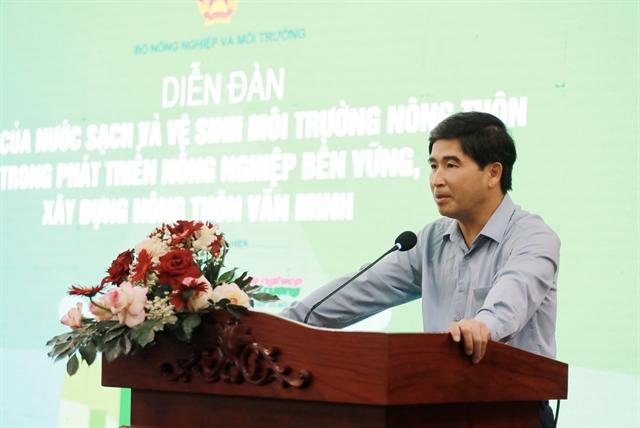 Society
Society


|
| Lương Văn Anh, Deputy Director of the Department of Irrigation Management and Construction, speaks at the forum. — VNA/VNS Photo Xuân Anh |
HÀ NỘI — Water is not only essential for agricultural production but also the foundation for developing ecological, circular agriculture adapted to climate change. Experts agreed while discussing the forum 'The role of clean water and rural environmental sanitation in sustainable agricultural development and civilised rural construction,' held in Hà Nội on Thursday.
The event was organised by the Department of Irrigation Management and Construction under the Ministry of Agriculture and Environment (MAE), in cooperation with the Agriculture and Environment newspaper.
Deputy Editor-in-Chief of the newspaper Vũ Minh Việt said, "Clean water and sanitation are not only essential needs but also the foundation for community health, rural living quality and a safe environment for agricultural production, especially amid green-clean-circular economic agricultural development and climate adaptation."
He added that Prime Minister’s Decision No 1978/QĐ-TTg, issued on November 24, 2021, approved the national strategy on rural clean water supply and sanitation until 2030, with a vision toward 2045.
It sets ambitious targets: all rural people using standard clean water, at least 90 per cent of households with hygienic latrines, and all rural schools and health stations with standard clean water and sanitation facilities.
Deputy Director of the Department of Irrigation Management and Construction Lương Văn Anh said agriculture currently faces major challenges from drought, saline intrusion and groundwater depletion.
"Without synchronised solutions in managing and using clean water, we cannot ensure sustainable productivity and quality of agricultural products in the future," he said.
Analysing regional disparities in rural water supply, Anh said the north had better infrastructure due to early investment, concentrated scale and complete treatment systems built years ago. Inter-communal water supply systems have tight management processes and long-term stability, facilitating private sector participation in operation and exploitation.
In key production regions like the Mekong Delta and Central Highlands, drought and lack of domestic water directly affect millions of people’s lives. This reduces rice, coffee and pepper productivity and forces farmers to shift crops, causing disruption to the agricultural ecosystem.
Regarding current status and resources, Giáp Mai Thùy, Deputy Head of the Rural Clean Water Management Division under the Department of Irrigation Management and Construction, said rural clean water supply plays an important role in implementing the National Target Programme on New Rural Construction (2021–2025).
"Up to now, about 68 per cent of rural households nationwide use water meeting standards, including 60 per cent from centralised supply works and eight per cent from household water systems. However, investment resources remain limited," he said.
He proposed completing mechanisms and policies, prioritising investment in large-scale centralised water projects for water-scarce, drought-affected, remote and island areas, reviewing and adjusting water prices, and guiding households to apply safe water storage solutions.
Many localities have formed models of cultivation using water-saving and wastewater reuse after treatment. In Long An, the 'circular water agriculture' model helped farmers reduce irrigation water by 20–30 per cent while increasing vegetable productivity by 10–15 per cent. Similarly, in Ninh Thuận, smart drip irrigation systems are widely applied in grape and apple production to reduce water and electricity waste.
Experts say to ensure clean water for production and living, Việt Nam must regard it as strategic infrastructure, equivalent to transport and energy. The irrigation system, reservoirs and rural water supply network need synchronised investment linked with land use planning and raw material area development.
"The MAE is implementing the national programme to restore rural clean water sources by 2035. The goal is to increase rural people using standard clean water to 80 per cent while increasing the use of recycled water in agriculture to 15 per cent," Lương Văn Anh said.
A highlight of the programme is promoting digital technology applications in water management and allocation. Real-time data helps localities proactively respond to water source fluctuations, especially in the dry season. New rural water supply works will be designed to save energy and reduce greenhouse gas emissions.
To enhance clean water supply, public-private partnership (PPP) models are encouraged. When businesses participate with localities, operating costs decrease, management efficiency rises, and people have more stable water access.
Environmental factors must also be central in all clean water policies. Agricultural wastewater treatment, protecting surface water sources and preventing pollution from livestock waste must be carried out alongside water supply planning. Only when the environment is protected can clean water truly be sustainable. — VNS




